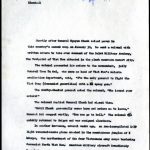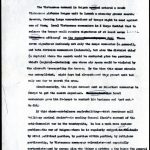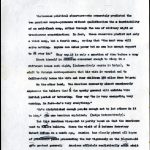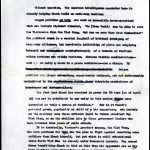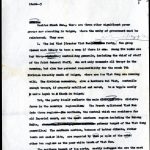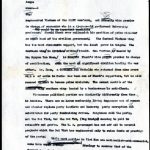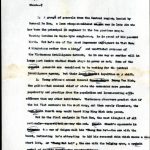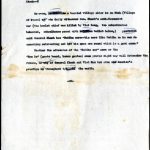1964, July, “General Nguyen Khanh”
Deepe
Khanh–1
Sent April 15. NY H.T.
Shortly after General Nguyen Khanh seized power in the country’s second coup on January 30, he sent a colonel with written orders to take over command of the Dalat Military Academy, the West point of Viet Nam situated in the plush mountain resort city.
The colonel presented his orders to the commandant, jolly General Tran Tu Oai, who once as head of Viet Nam’s malaria eradication department, said, “I’m the only general to fight the Viet Cong (Communist guerrillas) with a sl spray gun.”
The chubby-cheeked general asked the colonel, “Who issued your orders?”
The colonel replied General Khanh had signed them.
“Until Khanh personally comes here and orders me to leave,” General Oai snapped curtly, “You can go to hell.” The colonel was quickly returned to Saigon and was assigned elsewhere.
In another instance, several weeks ago, an American-piloted L-19 light reconnaissance plane crashed in the mountainous jungles of I aCorps, the northernmost of the four Vietnamese army corps bordering Communist North Viet Nam. American military aircraft immediately launched an extensive search for the plane in the tangled jungles of Quant Quang Tin province.
(More)
Deepe
Kha –nh–2
The Vietnamese command in Saigon command ordered a crack Vietnamese airborne Ranger unit to launch a nine-day ground search. However, fearing large concentrations of troops might be used against one of then, local Vietnamese commanders in I Corps decided that to release the troops would require signatures of at least LOCAL Vietnamese officers. on the samexmimemmfmpmmm day. These seven signatures included, not only the corps commander (a general), and both division commanders (colonels), but also the district chief (a captain) where the search would be conducted plus two province chiefs (majors)–includinlg one whose air space would be violated by the aircraft transporting th etroops. By the time this minor miracle was accomplished, eight days had elasped–and the gxground unit had only one day to search the area.
Simultaneously, the Saigon command sent an important commander to ICorps to get the search organized. Howevermlocalmcomm Local commanders have him 24-hours to conduct his business and “get out.” He did.
If this check-and-balance empirebuilding–which Americans call “military musical chairs”–is eroding General Khanh‘s command of the anti-Communist war in the countryside, he has a much more serious problem–the war of Saigon–where he is regularly snipped in the heelsAT by rival political parties, by parties within parties, by religious partisanship, by Vietnamese newspaper colmunists–and by anyone else who things a potshop a day keeps the general away. (More)
Deepe
Khanh–3
Vietnamese political observers–who accurately predicted the two previous coups–pronounce without qualification the x inevitability of an anti-Khanh coup, either through the use of military might or treacherous assassinations. In fact, these observers predict not only a third coup, but a fourth one., noting that “the next coup will solve nothing. Anyone can seize power but no one has enough support to xx stay in.” They say it is only a question of time before a coup
Khanh himself is conceren concerned enough to sleep in a different house each night, (informatively source is Lodge), to admit to foreign correspondents that his wife is worried and to deliberately house his wife and four children 350 miles from Saigon
On the other hand, the American community almost unanimously expressos the believe that K the spunky general will outride this initial period of tottering. They say “He is very energetic, very cunning, in fact–he’s very everything.”
“He’s dirtytricked enough peopole enough not to let others do it to him,” asx one American explained. (Lodge informatively).
Yet this American viewpoint is partly based on what the Americans want to blieve believe. Since the visit of ax Defense Secretary Robert McNama-ra a month ago, America has clearly pinned all hopes of prosecurit prosc prosecuting the war vigorously on the 36-year-old gote goateed general. American officials realisticallyadmitt admit that if Khanh is toppled, the anti-Communist war effort will hopelessly deteriorate. They even halfheartedly admit threaten and American wichwithdrawal if Khanh goes.
Deepe
Khanh–4
Without question, the American intelligence apparatus here is clearly helping Khanh build an anti-coup machine. ____
Saigon politics en toto are such an incredible never-neverland that one Western diplomat lamented, “We (Free World) may be able to save the Vietnamese from the Viet Cong, but can we save them from themselves?” The political scene is a snarled fuzzball of habitual intrigue; of betrayal and counterbetr counterbetrayal; of a tornado of factions within factions wfx within factions. Obvious visible manifestations–such s a as unity a shown in a press conference–are a mirage. Th ThmmThmmdsdhhhhmmmmmmmmmm Saigon politics are always subsurface, consistently indirect, and not infrequently manipulated by the mnxfmmm fairta faury fairytale predictions of horoscopes and fortunetellers.
The fact that Khanh has remained in power for 80 days (As of April 19) can not be attributed to any unity in this nation whaxex once described as “only a series of families.” Nor is it Khanh‘s personal power, popularity or skill of x his supporters, who include on the military side those officers loyal to former president Ngo Dinh Diem, or on the civilian side to those government leaders who have returned from years of exile abroad.
It is ironically, Vietnam’s greatest enemy, the Viet Cong, who have provided for thxx him the glue to fight against something more ruthless than Khanh himself, but yet which is still sub-national since North Viet Nam is already under Communist control. The second favor benefitting Khanh is that at this time his opponents are as bys busy fighting among themselves as they are frighting against him.
(MORE)
deepe
khanh–5
Besxxes
Besides Khanh Inc., there are three other significant power groups now opoerating in Saigon, where the unity of government must be reinforced. They are:
1. The Dai Vet (Greater Viet Nam) Parmmxymm Party, Anti-Communist, Largely Catholic the group d3eemed most likely to toss a coup if there is one. Among its ranks are key troop-controllojcontrolling generals, including the chief of staff of the Joint General Staff, who not only commands all troops in the country, but also has personal responsibility for the crack 7th Division directly south of Saigon, where are the Viet Cong are running wild. The division commander, also a hardcore Dai Vet, controlls enough troops, if properly mobilized and moved, to x topple easily kx units loyal to x Khanh in Saigon.
Yet, the party itself reflects the main dicis devisive divisive force in the country: regionalism. The French splintered Viet Nam into three regions–3the northern, the central which was residence for old Imperial court, and the sourt southern region including the Mekong Delta, xhmmazmakdmgmmmgmmmmmm primary target of the Viet Cong guerrillas. The southern section, because of hotter climate, richer lands and easier life, are regarded by thex pe-ople of the othe4 other two regions as the poor white trash of Viet Nam.
The northern branch of the party, mostly refuggees who are the most educated and energetic in the country, is significantly represented in the government by the Foreign Minister, Dr. Phan Huy RxQuat, who [?]
deepe
khanh–6
fdpf
represented Vietnam at the SEATO conference, and inxxxlly[FRS?] vice premier in charge of economies who is a 43-year-old ex-Harvard University professor.WhoHe would be an important candidate Should Khanh ever relinquish his position of prime minister as oncce head of the civilian government, the Central Vietnam wing has the most rice-roots support, but the least power in Saigon. The Southern wing is divideds withing itself. One faction is headed by Dr. Nguyen Ton Hoan, isKhannos Khanh‘s vice proimm premier in charge of pacification, mmax the most si significant civilian heading the war effort. Dr. Hoan, a Cathloic Cah Catholic who returned from nine years ov e e of exile in Paris has been one of Khanh‘s supporters, but is also rumored to want to become prime minister. The second section of the souther wing southern wing headed by a businessman is anti-Khanh.
Vietnamese political parties are distinctly differently from thosE in America. There are no known membership lists; ingenuous use of rumors and slander replace party leaflets and banners; party corruption sib substitutes for party fundraising drives. Saigonese call the party, not the Dai Viet, but the Dai Vet, (Big Dredged) meaning to pull in rake-offs and grafts. The U. S. government has out off aid to several projects which the Dai Viet has engineerred only to raise funds or prestigre of the party.
While most parties in Viet Nam are nationalist-anti-communist, none have anxdx ideolo (More) ideology to counter that of the Communists. Most groups revolve around personalities, “and there are always more leaders than members in any party,” one Vietnamese commented.
(More)
Deepe
Khanh–7
2. A groupd of generals from the Central region, headed by General Do Mau a lean stoop-shouldered mx mxx man in late 40s who has been the principalinengineer in the two previous coups. Wearing Carmine de Sapio-ty0e sunglasses, he is proud of his peasant birth. Yet he’s one of the most ingenuous ingriguers inViet Nam. A kingmaker rather than a king, and unofficial overseer of the Vietnamese intelligence network, he in one way or another will in large part decide whether Khanh stays in power or not. Some of the generll generals are considered to be working for the central intelligence agency, but their loayl loyalit loyalties ma-y shift.
3. Young officers around General Duacc Pugon Duong Van Minh, the goldtoothed nominal chief of state who commandes more genuine popularity and prestige from the population and lower-ranking offie officers than any other individual. Vietnamese observers predict that if the Dai Viet succeeds in the next coup, and then surely flounders, the fout fouth fourth coup would boost Ming Ming Minh into power.
But in the final analysis in Viet Nam, the most illogical of all rationale–superstition–may win out. Khnahh Khanh‘s opponents in fnxggnxm the war of Saigon call him “Thang Rau De”–the one with the beard, indicating he’s attempting to hid his recessed chin which means a shor short life, or “Thang Mat Loi”, the one with the bulging eyes, a symbolb symbol of trushtw trustworthy trustworthiness.
(More)
deepe
khanh–8
However, imxmmimmxin a bearded village elder in An Binh (Village of Peace) xx who daily witnesses Gen. Khanh‘s anti-Communist war (the hamlet chief was killed by the Viet Cong, two subordinates beheaded, schoolhouse poxed with bmllmtmm bullet holes,) predicted said General Khanh has “Buddha ears–big ears like Buddha so he can do something outstanding and hiw his eyes are round which is a good omen.”
Whether the advocates of the “Buddha ear” omen or the “Reu De” (goats beard, hence goatee) omen proves right may well determine the future, no nly NOT ONLYof General Khanh and Viet Nam but also ihm America’s prestige in throughout tyh he the world.
-w0-
Read Previous Article: 1964, July, “Le Phan Hungnn Interview”
Read Next Article: 1964, August, “North Vietnamese Troop Infiltration”

